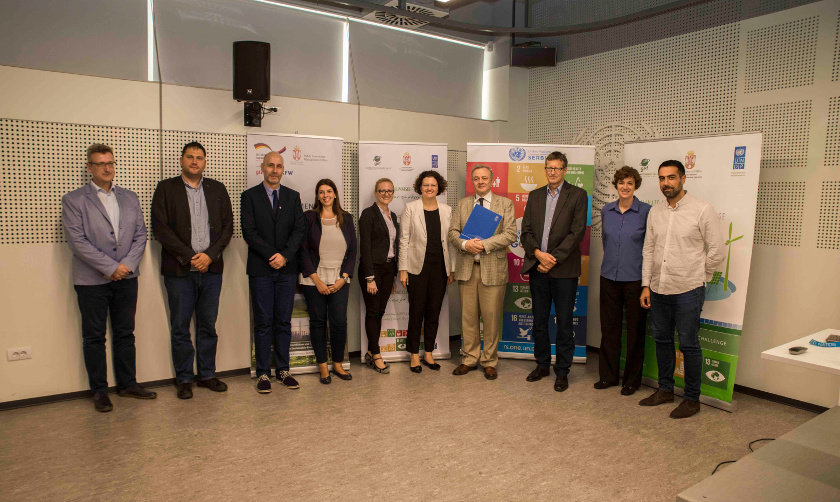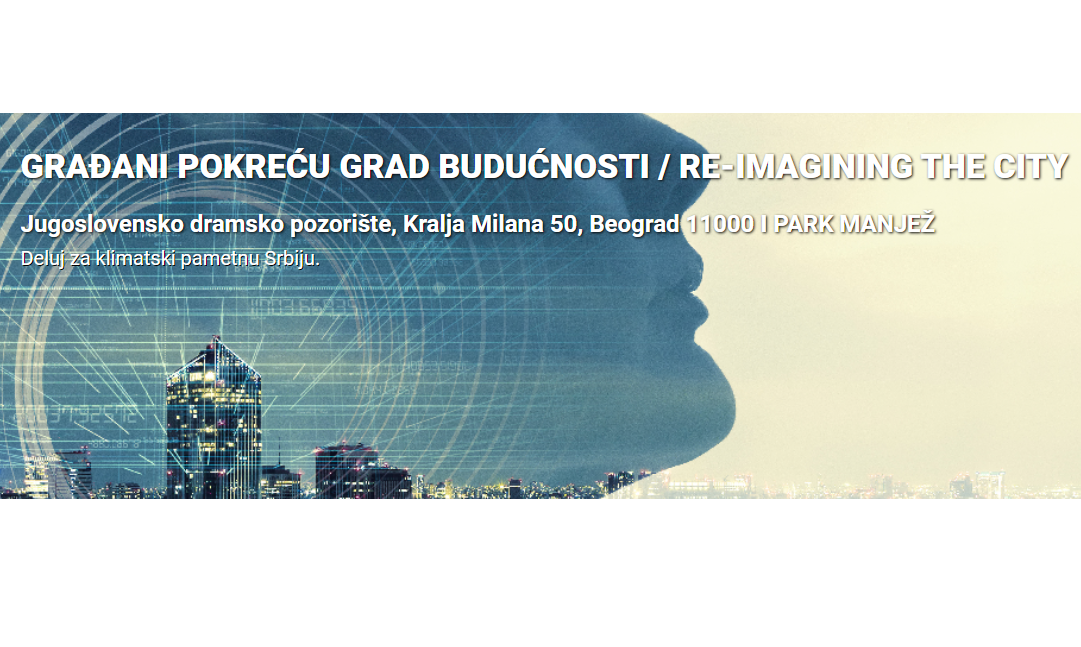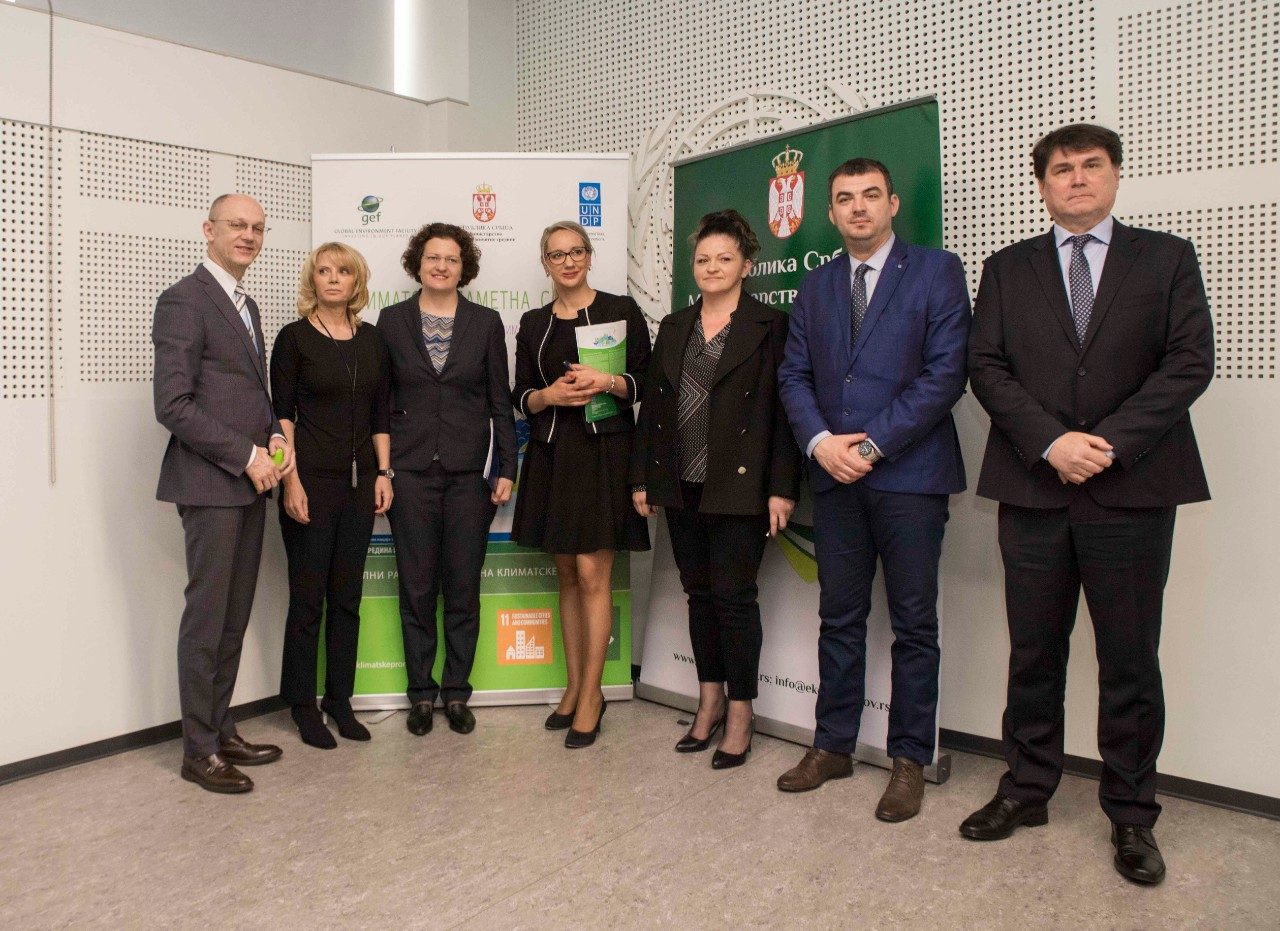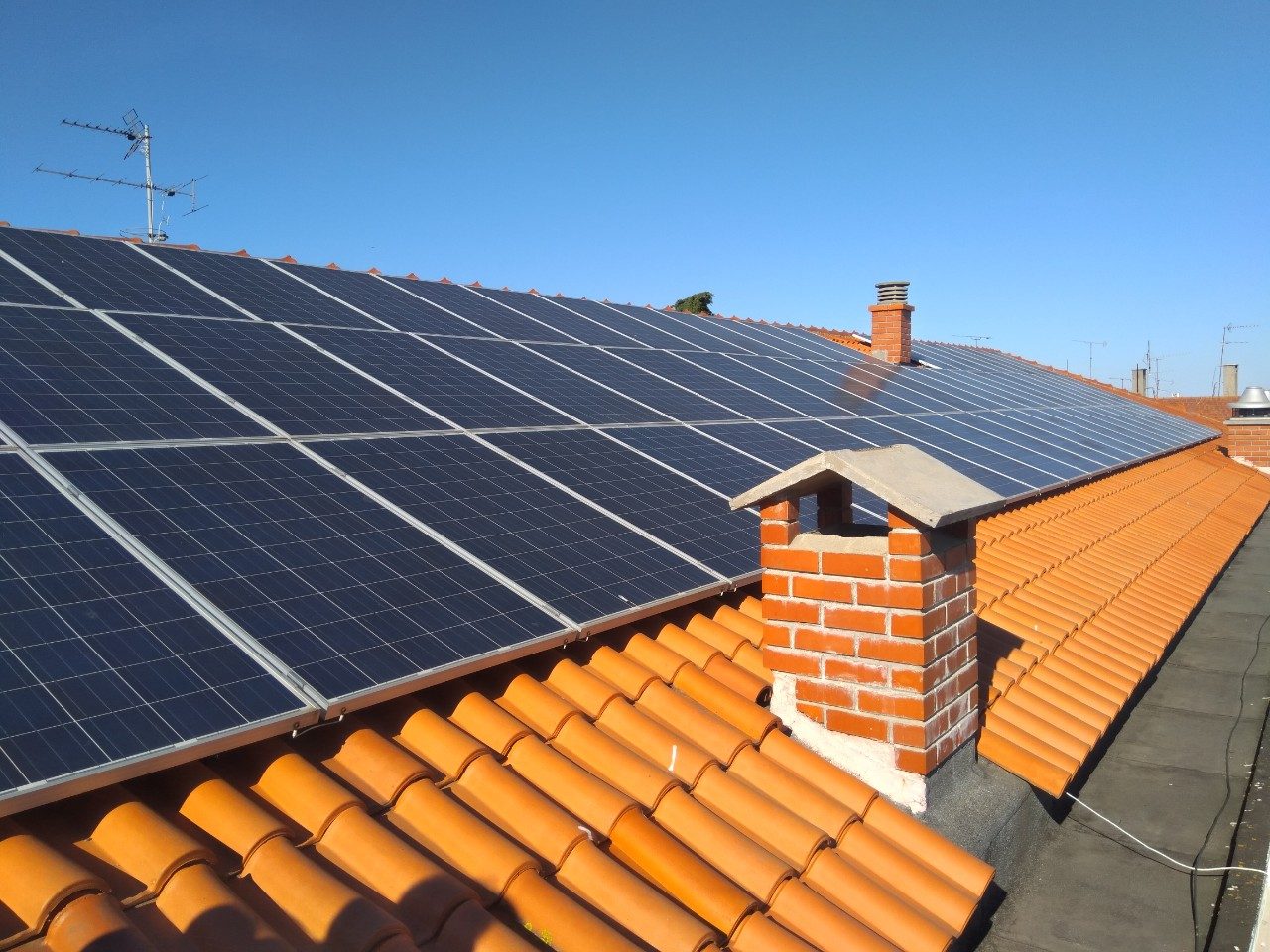-
Oct 07 2019 Welcome to the conference “Citizens Build Smart Cities”
We are inviting all interested stakeholders to the knowledge-sharing conference “Citizens Build Smart City/Re-imagining the city”. Event will take place on Thursday the 10th of October, at the Jugoslav Drama Theatre (50 Kralja Milana Street, Belgrade) starting at 10:00 a.m.
The United Nations Development Programme (UNDP) in Serbia, acting as an implementing agency of the Global Environment Facility (GEF), is supporting the Ministry of Environmental Protection (MoEP) in implementing the five-year “Climate Smart Urban Development” Challenge project, jointly financed by the GEF, MoEP and partners.
An interactive event “Citizens Build Smart Cities/Re-imagining the City” will be held in order to accelerate the change towards climate – smart communities. The one-day open event aims to motivate and connect citizens, the private sector and local authorities to initiate the necessary transformation. Demonstrating the potential, we invite citizens and other stakeholders to join and start building common infrastructure.
The Conference is organized around three stages:
- Main stage (representatives of smart cities from around Europe present the best practices and solutions in open panel discussions),
- Smart stage (practical learning through workshops on open data and alternative financing with international and lecturers from Serbia),
- In the Zone (fair of ideas, new technologies and business models open to all citizens).
Conference Agenda and more information you can find on: http://gradovi-buducnosti.adriamediagroup.com/
-
Apr 22 2019 Five climate-smart projects receive funding for implementation in Serbia
The Ministry of Environmental Protection and the United Nations Development Program (UNDP) presented the results of the Climate Incubator and allocated funds for the implementation of innovative technology solutions and business models for reducing greenhouse gases in five municipalities and cities, but also throughout Serbia because of the high possibility of replication.
The grants for the co-financing of technological solutions and business models were granted to the following companies: JKP Toplana Šabac, Eso Tron, Jugo-Impex d.o.o, Sanicula d.o.o. and GreenEnergy Point d.o.o. Implementation of their ideas will contribute to the increase of energy and cost efficiency, increase in the share of energy produced from renewable sources, stimulate circular economy and improve waste management throughout Serbia, especially in Nis, Paracin, Boljevac, Rumenka, Sabac.
The representatives of five winning teams have signed agreements and funds were allocated to co-finance the implementation of their five projects. The total value of the awarded grant is $ 470,000, and the total investment value is about $11,000,000. The expected reduction of the greenhouse gas emissions, over the life span of the awarded projects, is 500,000t CO2 equivalent, or, to illustrate, just as much as if we planted 115,000 trees or afforested areas the size of 145 football stadiums.
“‘Climate Smart Urban Development Challenge’ is one of the most important projects the Ministry of Environmental Protection implements because it entails expertise, financial support, innovation and concrete results,” said Minister Goran Trivan. „Serbia has been polluted long enough, we want to solve the environmental issues together and through concrete actions. The Ministry will continue to support innovative ideas and new technological solutions that will give tangible results in the fight against climate change, but will also improve the overall quality of the environment,” Minister Goran Trivan emphasized at the signing ceremony.
“UNDP supports the development of innovative ideas through the Climate Incubator, as well as their implementation, so as to contribute to the climate change mitigation and sustainable development in Serbia. Addressing climate change also makes good business sense. Reduction of greenhouse gas emissions saves money because it improves energy and operational efficiency, reduces production costs and enhances product sales, making them more competitive,” said UNDP Serbia Resident Representative a.i. Steliana Nedera.
Public call “Innovation Challenge”, announced within the Climate Smart Urban Development Challenge, joint project of the Ministry and UNDP, has helped to identify and source innovative, climate smart development ideas and projects that reduce greenhouse gas emissions and support the climate resilience of local communities in Serbia. In addition to initial financial support, the award-winning innovators had the opportunity to develop their ideas into the mature projects ready for implementation, in the “Climate Incubator/Accelerator” established within the project.
-
Apr 01 2019 Mayors’ initiative to increase the usage of solar energy
UNDP together with Citizenergy platform, the European aggregator platform of all sustainable energy crowdfunding platforms and Energy Cities Europe, welcomed mayors from eight countries: Moldova, Serbia, Georgia, Tajikistan, Croatia, Somalia, Lebanon and Portugal, in order to launch an initiative for promotion of new financial models for solar power projects. Local communities, which are included in Climate Accelerator of the “Climate Smart Urban Development Challenge” project, presented their projects in Lisbon, on March 18 and 17. On the occasion, representatives of the cities welcomed the mayors’ platform for boosting solar energy, called “Solar Mayors platform”.
Given that the potential of solar energy usage is increasing, due to constant technology developments, as well as affordability of solar panels due to decreasing prices in the last decade, it is necessary to find new financial models and form a platform for the exchange of experiences. For that reason, the “Solar Mayors platform” has been launched, where all the participants will have an opportunity to learn about the latest trends in the usage of solar energy, share best practices and promote citizen engagement in the usage of renewable energy sources. The platform should establish cooperation between the local and national levels, involve civil society organisations, private sector and citizens in increasing transparency and efficiency of institutions, and encourage innovation and cooperation of all stakeholders.
New financial models such as crowdfunding, energy cooperatives, cryptocurrencies (SolarCoin) and energy service companies financed by savings (ESCO) were presented during the event and it is expected that these models will support the increase of solar energy production in cities.
The participants of the workshop included representatives from the city of Kragujevac, Niš and Šabac, who gained valuable knowlegde about crowdfunding campaigns, which they plan to implement during this and next year in order to purchase solar panels and install them on public building roofs. Depending on the type of projects, it is planned to raise funds through donation crowdfunding for projects in Kragujevac (kindergarten Zeka) and Šabac (Center for children and youth), while the funds for procurement of solar panels for the public utility company “Toplana Šabac” will be secured through investment crowdfunding. Representatives of these cities are the first who joined the “Solar Mayors Club” which provides them with an opportunity to connect with other cities, exchange experience in crowdfunding campaigns and support implementation of similar projects in other cities in Serbia.
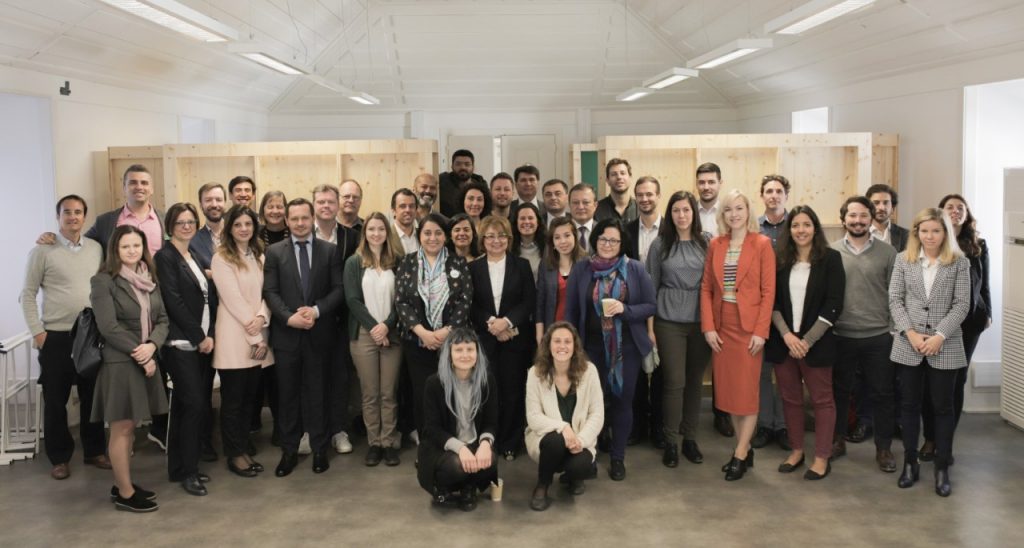
-
Sep 28 2018 Representatives from UNDP and Secretariat for Transport of City of Belgrade participated in European Mobility Week bicycle ridе
European Mobility Week, on 22 September “Car-Free Day”, have been celebrated with a bicycle ride from the intersection of Mihailo Pupin Boulevard and Nikola Tesla Boulevard to Zemun’s quay, organized by Belgrade’s Secretariat for Transport, Red Star Cycling Club and with the help of the UNDP “Climate Smart Urban Development” project.
Dušan Rafailović, Belgrade’s Secretary for Transport, and his closest affiliates actively participated in the bicycle ride, as did the representatives of the UNDP “Climate Smart Urban Development“ project.
The “Climate Smart Urban Development” is a five year project aimed at lowering greenhouse gas emissions and helping local communities in Serbia to become more resilient to climate change. The Ministry of Environmental Protection implements the project with the support of the United Nations Development Program (UNDP) and with the financial support of the Global Environment Facility (GEF).
-
Sep 24 2018 GIZ and UNDP jointly for climate-smart and energy-efficient Serbia
Belgrade, September 21, 2018 – The Memorandum of Understanding between the Deutsche Gesellschaft für Internationale Zusammenarbeit (GIZ) GmbH and the United Nations Development Program (UNDP) was signed in the premises of the UN in Serbia today, with the aim of maching and coordinating activities that target fight against climate change in Serbia.
Since 2016, GIZ and UNDP jointly have been supporting the Government of the Republic of Serbia and have been working closely with the Ministry of Mining and Energy and the Ministry of Environmental Protection to help them in increasing existing and attracting new investments in the areas of energy efficiency and renewable energy sources.
“Today’s Agreement envisages the expansion of our cooperation and includes complementary activities that contribute to the reduction of greenhouse gas emissions (GHG) and enable local communities in Serbia to become more resilient to climate change,” said Steliana Nedera, Deputy Resident Representative of UNDP Serbia, pointing out “One of the first things we will do, in partnership with the Ministry of Environmental Protection and GIZ, is to provide further impetus to maturing of climate smart innovative ideas within the Climate Incubator and to provide all necessary support for their implementation in practice”.
Mr. Gerhard Sippel, director of the Deutsche Gesellschaft für Internationale Zusammenarbeit (GIZ) GmbH in Serbia, stated that the cooperation between GIZ and UNDP is a natural and necessary step, emphasizing: “GIZ, on behalf of the German Government, is implementing programs that directly enhance energy efficiency in public buildings, build capacities of partners and overcome barriers to implementation of projects in the field of bioenergy, at the same time improving the process of making investment decisions in this area. The joint activities within our cooperation will further strengthen the capacities of our partners, local self-governments, to implement projects that will contribute to the reduction of greenhouse gas emissions and thus ensure the sustainable development of their communities.
The Climate Incubator was established in May 2018 within the Climate Smart Urban Development Challenge project, implemented by the Ministry of Environmental Protection with the support of the Global Environment Facility (GEF) and UNDP. Within it, 40 teams that had the most innovative ideas and projects to reduce greenhouse gas emissions and improve the management of data of importance for the fight against climate change – receive expert support and assistance in finding sources of co-financing, promotion and linking with other climate innovators.
The complementary activities of GIZ and UNDP contribute to the fulfillment of the obligations that Serbia has undertaken in the framework of the Paris Agreement, as well as in the process of accession to the European Union. At the same time, progress is being made towards the achievement of the global sustainable development goals, especially those related to the Climate Action, ensuring access to affordable and clean energy and building sustainable cities and communities.
